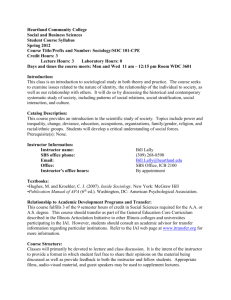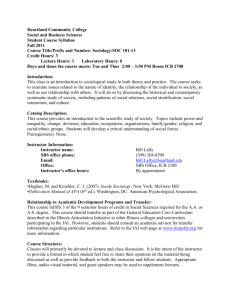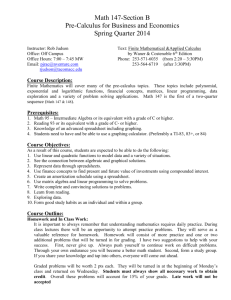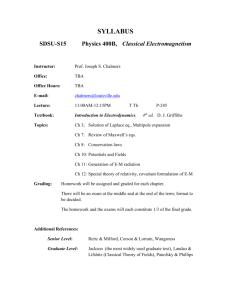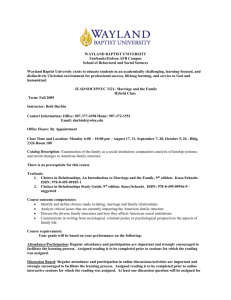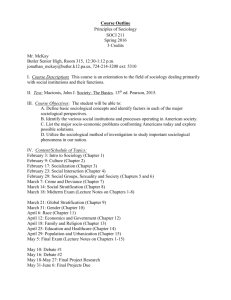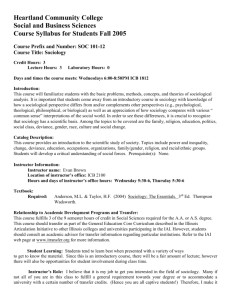SOC 101 CEN2 PRESLEY SP 12
advertisement
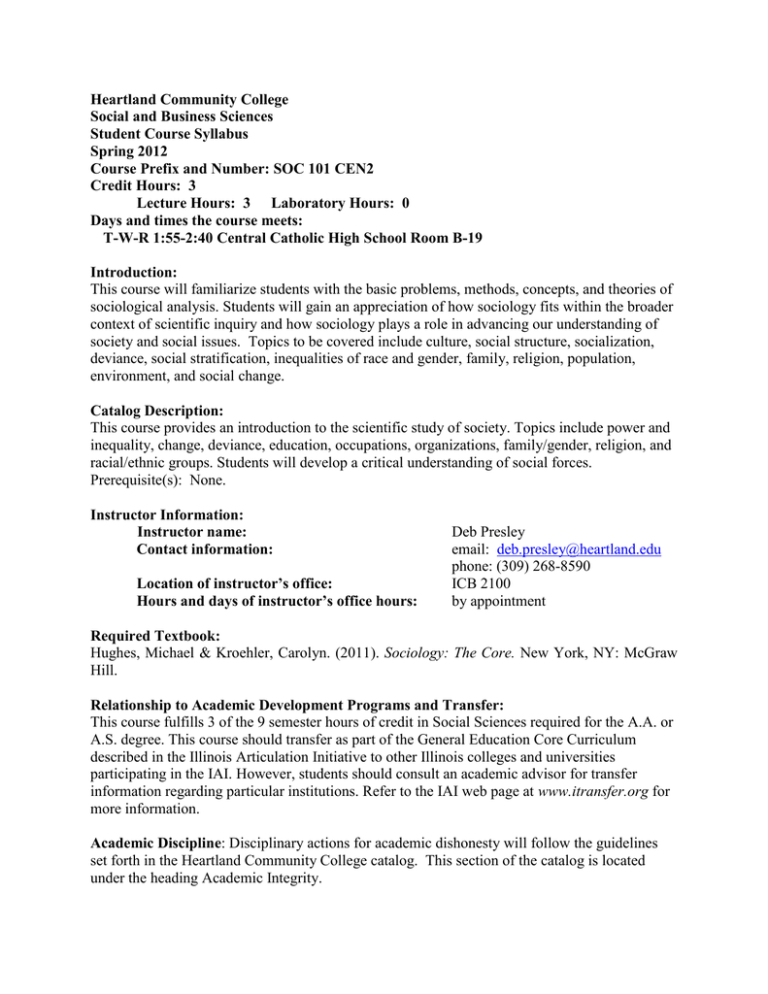
Heartland Community College Social and Business Sciences Student Course Syllabus Spring 2012 Course Prefix and Number: SOC 101 CEN2 Credit Hours: 3 Lecture Hours: 3 Laboratory Hours: 0 Days and times the course meets: T-W-R 1:55-2:40 Central Catholic High School Room B-19 Introduction: This course will familiarize students with the basic problems, methods, concepts, and theories of sociological analysis. Students will gain an appreciation of how sociology fits within the broader context of scientific inquiry and how sociology plays a role in advancing our understanding of society and social issues. Topics to be covered include culture, social structure, socialization, deviance, social stratification, inequalities of race and gender, family, religion, population, environment, and social change. Catalog Description: This course provides an introduction to the scientific study of society. Topics include power and inequality, change, deviance, education, occupations, organizations, family/gender, religion, and racial/ethnic groups. Students will develop a critical understanding of social forces. Prerequisite(s): None. Instructor Information: Instructor name: Contact information: Location of instructor’s office: Hours and days of instructor’s office hours: Deb Presley email: deb.presley@heartland.edu phone: (309) 268-8590 ICB 2100 by appointment Required Textbook: Hughes, Michael & Kroehler, Carolyn. (2011). Sociology: The Core. New York, NY: McGraw Hill. Relationship to Academic Development Programs and Transfer: This course fulfills 3 of the 9 semester hours of credit in Social Sciences required for the A.A. or A.S. degree. This course should transfer as part of the General Education Core Curriculum described in the Illinois Articulation Initiative to other Illinois colleges and universities participating in the IAI. However, students should consult an academic advisor for transfer information regarding particular institutions. Refer to the IAI web page at www.itransfer.org for more information. Academic Discipline: Disciplinary actions for academic dishonesty will follow the guidelines set forth in the Heartland Community College catalog. This section of the catalog is located under the heading Academic Integrity. Student’s Role: Students are expected to read the textbook prior to lecture and will be responsible for learning the materials presented in the book. Classroom lecture will augment, not repeat, the information presented in the textbook. Students are expected to ALWAYS attend class and participate in classroom discussions. Instructor will record participation in classroom discussions. Being able to articulate one’s own position and actively listen to a classmate’s position heightens the student’s understanding of sociological issues. You are expected to bring your texts to class on a daily basis. Instructor’s Role: The instructor’s role is to facilitate a student’s learning process by supplementing the textbook with thoughtful lectures, leading class discussions about social issues from a sociological perspective, and providing opportunities for students to demonstrate their knowledge of sociology through written assignments and formalized exams. Course Learning Outcomes: At the completion of this course, students should have proficiency in the following areas of sociological knowledge 1. Demonstrate awareness and understanding of the science and research methods developed in sociology. 2. Apply the basic sociological paradigms – structural functional, social conflict and symbolic interaction. 3. Define, give examples and demonstrate the relevance of the following sociological notions: culture, socialization, deviance, stratification, social structure and social change. 4. Analyze the major social institutions such as family, government, economy, religion, education and medicine. 5. Identify and offer explanations of social inequality while considering the relationship to social process, social interaction and institutions. 6. Examine and explain the impact of human relations on patterns of urbanization and the physical environment 7. Analyze and demonstrate awareness of the impact of cultural diversity in our society. The above sociological objectives will be accomplished while implementing the college’s following general learning outcomes. PS1 –Students can solve problems based on examples and frameworks provided by instructor CO2- Students effectively deliver a message via various channels/modalities DI3- Students reflect upon the formation of their own perspectives, beliefs, opinions, attitudes, ideals and values. Course/Lab Outline: 1. Developing a Sociological Consciousness 2. Culture and Socialization CT2 – Students determine value of multiple sources or strategies and select those most appropriate in a given context 3. Social Structure, Groups and Organizations 4. Deviance and Crime 5. Social Stratification 6. Inequalities of Race, Ethnicity and Gender 7. The Family 8. Social Institutions 9. Population and Environment 10. Social Change Method of Evaluation (Tests/Exams, Grading System): The grading scale is as follows: 90 - 100 A 80 - 89 B 70 - 79 C 60 - 69 D 00 - 59 F Expected Papers, Exams, and Other Assignments 4 Unit Exams* 100 points each Final Exam (Cumulative)* 100 points 5 Papers 50 points each 1 Paper 100 points In-Class Assignments & Class Participation 50 points total * You must take the exam on the day / time it is scheduled. You will NOT be allowed to make up an exam. You will, however, be allowed to drop your lowest exam score from the semester. If you know you are going to absent the day of an exam notify me immediately and we can discuss the possibility of you taking the exam early. If you have taken the 4 unit exams and are happy with your grades, you do NOT need to take the final exam. Papers are due at the beginning of class. Any paper or assignment handed in after class will be considered late. Late papers will be deducted one letter grade for each calendar day they are late. Incompletes: An incomplete for the course is only assigned in extreme cases. If an incomplete is needed a student must request a face-to-face meeting. The student should be prepared to fully explain the reason why the incomplete is needed and also have a schedule outlining the timeframe for completion of the unfinished course work. Make-up of tests and in-class assignments is NOT allowed. Of the four exams and final exam, I will allow you to drop your lowest score. Therefore, if you miss an exam you receive a 0 and can drop this as your lowest score. If you do not miss any exams and are happy with your 4 exam scores, you will not need to take the comprehensive final exam. Please note that I will not allow you to make up a missed exam to compensate for poor performance on another one. In-class assignments, because of their group nature, cannot be made-up. Paper / Assignment Deadlines: Due dates are NOT negotiable. Any paper handed in after I collect them will be considered late. One letter grade will be deducted for every calendar day that they are late. Student Conduct: You may not agree with all of the views and opinions expressed during class. Please be respectful of all opinions regardless of whether they match your own. Intellectual growth occurs with an open mind. Silence your cell phones and do NOT interact with your electronic devices during class. Do not leave class without seeking permission from the instructor. Practice the golden rule. Syllabi disclaimer: This document is meant to be a guideline for student and class expectations. There are certain aspects that will not be amended because they are policies of this institution. However, the instructor holds the right to amend certain parts of this document at any time during this semester in order to make certain that the class remains focused on its objectives and goals. The Course Calendar Outline provides students a general sense of the pace of the course. Actual topics covered in lecture are subject to change as dictated in class discussion. Course Calendar Outline Date Week 1 1-17-12 1-18-12 1-19-12 Week 2 1-24-12 1-25-12 1-26-12 Week 3 1-31-12 2-1-12 2-2-12 Week 4 2-7-12 2-8-12 2-9-12 Week 5 2-14-12 2-15-12 2-16-12 Week 6 2-21-12 2-22-12 2-23-12 Week 7 2-28-12 2-29-12 3-1-12 Week 8 3-6-12 3-7-12 3-8-12 Week 9 3-13-12 3-14-12 3-15-12 Chapter Topics Exams & Papers Class Conflicts Chap 1 – Developing a Sociological Consciousness Paper 1 Assigned Chap 2 – Culture & Social Structure XXX Chap 3 - Socialization XXX No Juniors Paper 2 Assigned No Students Exam 1 (1-3) Chap 4 – Social Groups & Formal Organizations Chap 5 – Deviance & Crime In class assignment Chap 6 – Social Stratification PTR Meeting – No Instructor Paper 3 Assigned Exam 2 (4-6) Chap 7 – Inequalities of Race & Ethnicity Paper 4 Assigned Chap 8 – Gender Inequality Week 10 3-20-12 3-21-12 Chap 9 – Political & Economic Power 3-22-12 SPRING BREAK 3-25-12 / 3-31-12 Week 11 4-3-12 4-4-12 4-5-12 Week 12 4-10-12 4-11-12 4-12-12 Week 13 4-17-12 4-18-12 4-19-12 Week 14 4-24-12 4-25-12 4-26-12 Week 15 5-1-12 5-2-12 5-3-12 Week 16 5-8-12 5-9-12 5-10-12 Chap 10 – The Family Paper 5 Assigned Exam 3 (7-9) Chap 11 – Religion, Education, & Medicine Chap 12 – Population & Environment Paper 6 Assigned XXX Chap 13 – Social Change No Seniors Exam 4 (10-13) Course Review Final Exam (Comprehensive) Final Class AP Exams AP Exams AP Exams General Information for Students Testing Services (located in Student Commons Building 2001) Testing Services provides a secure testing environment for students who are enrolled in online, hybrid, and other distance learning courses; have a documented disability; or need to take a make-up exam. Testing accommodations for students having documented disabilities must be arranged by the student through Disability Support Services, and Testing Services will only administer make-up exams at the request of the instructor. For more information, please call (309) 268-8050. Services in Academic Support Center (Raab Road campus) Library The Library provides fast and free access to credible information from a full range of resources including books, online journals, videos, newspapers, online music, class reserves, and interlibrary loan. Individualize research by appointment or come in anytime. See the Library tab in myHeartland, email library@heartland.edu or call (309) 268-8292 for details. Tutoring Services Tutoring Services provides tutoring in various forms at no cost to Heartland students in Normal, Pontiac, and Lincoln. Tutors are available at convenient times throughout the week. Study groups are also available by request. For more information about services available at each location, please call (309) 268-8231 (Normal), (815) 842-6777 (Pontiac), or (217) 735-1731 (Lincoln). Disability Support Services Disability Support Services (DSS) ensures that students with disabilities have equal access to the college’s programs, services and activities through the provision of reasonable accommodations as mandated in Section 504 of the Rehabilitation Act and the Americans with Disabilities Act. DSS offers a wide range of services to support students with disabilities, including: assistive technology, document conversion services, personnel, classroom and testing accommodations. Students with a documented disability who wish to discuss academic accommodations should call (309) 268-8259 for details. Writing Services Writing Services provides guidance for writers on assignment comprehension, critical thinking and the stages of the writing process. Writing Services is staffed by English faculty with years of experience in the teaching of writing. In every session, faculty work with writers to explore and develop their own ideas as appropriate to the needs of their readers and to learn the rhetorical strategies necessary for effective communication. For more information, please call (309) 2688231. Counseling Services The personal development counselor provides confidential and professional counseling for both emergency and personal issues. Services also include referrals to local community resources. For more information, please call (309) 268-8033. Academic Integrity Academic integrity is a fundamental principle of collegial life at Heartland Community College and is essential to the credibility of the College’s educational programs. Moreover, because grading may be competitive, students who misrepresent their academic work violate the right of their fellow students. The College, therefore, views any act of academic dishonest as a serious offense requiring disciplinary measures, including course failure, suspension, and even expulsion from the College. In addition, an act of academic dishonesty may have unforeseen effects far beyond any officially imposed penalties. Violations of academic integrity include, but are not limited to cheating, aiding or suborning cheating or other acts of academic dishonesty, plagiarism, misrepresentation of data, falsification of academic records or documents and unauthorized access to computerized academic or administrative records or systems. Definitions of these violations may be found in the college catalog. Plagiarism Plagiarism is the presenting of others’ ideas as if they were your own. When you write a paper, create a project, do a presentation or create anything original, it is assumed that all the work, except for that which is attributed to another author or creator, is your own. Plagiarism is considered a serious academic offense and may take the following forms: Copying word-for-word from another source and not giving that source credit. Paraphrasing the work of another and not giving that source credit. Adopting a particularly apt phrase as your own. Using an image or a copy of an image without crediting its source. Paraphrasing someone else’s line of thinking in the development of a topic as if it were your own. Using another person’s project or another person’s work as if it were your own. [Adapted from the Modem Language Association’s MLA Handbook for Writers of Research Papers. 7th ed. New York: MLA, 2009:51-61] Note that word-for-word copying is not the only form of plagiarism. The penalties for plagiarism may be severe, ranging from failure on the particular piece of work, failure in the course or expulsion from school in extreme cases. Many plagiarism problems can be remedied by citing the sources of the original work. When in doubt, cite the source according to the style your instructor directs. Usually this is APA or MLA Style. Don’t be daunted by citing sources that are not books. You can cite everything, including pamphlets, maps, cereal boxes, telephone conversations, movies, television shows, Internet and world-wide web sites. Notice of Cancelled Class Sessions Cancelled class sessions, for all HCC classes, will be listed under Cancelled Class Meetings in the A-Z Index and under Academic Information in the Current Students page on the HCC Web site. Go to http://www.heartland.edu/classCancellations/ to learn what classes have been cancelled for that day and the upcoming week. Be sure to check the last column, which might contain a message from the instructor.
